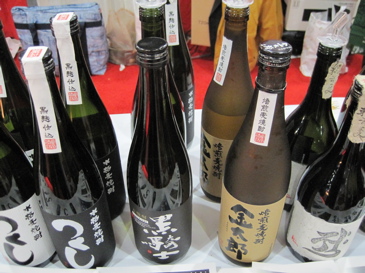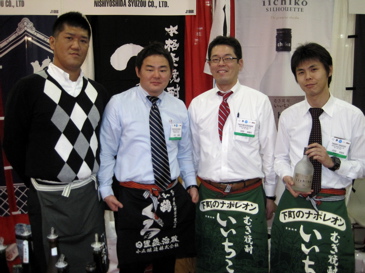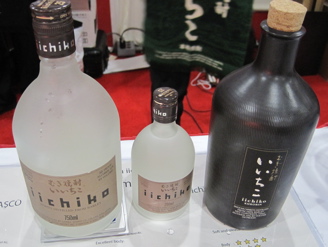At the International Restaurant & Foodservice Show yesterday, I bypassed the fermented yuzu peel at the Japan Pavilion and went straight to the shochu tables…
While the brewed beverage sake–often thought of as “rice wine”–is more widely known here in the United States, in Japan, shochu sales have been surpassing sake’s for several years.
Shochu, a distilled spirit, contains more alcohol than sake (generally 20 – 30 proof versus about 15 proof), but it has no residual sugar. That might be a key to it’s popularity. According to Mr. Kusuhashi, Assistant Sales Manager for iichiko brand, drinking shochu means “less calories, no hangover.” He certainly knew which benefit statements to hammer home to us Americans.
Shochu production dates from the 15th century and is notable for having been the drink of choice for Shigechiyo Izumi who, at one point, was the Guinness Book record-holder for the oldest living person–120+ years. So, if “less calories, no hangover” didn’t sell you on the stuff…
Mr. Izumi probably mixed his shochu with hot or cold water or drank it in his tea, as is traditional. Nowadays, it’s also served on the rocks or mixed into cocktails, as well (watch this space!) As evidence of that, the Yubeshi Souhonke Nakauraya Company’s booth across the way was using it to spike their just-introduced yuzu juice and honey beverage.
Shochus can be made from barley (“mugi shochu“), sweet potatoes (“imo shochu“) or rice (“kome shochu“), and come in a wide variety of qualities and price-points. While Peterson advocates tasting and choosing for yourself, for shochu newbies, iichiko, the best-selling brand in Japan, is an accessible starting point. A mugi shochu–it was smooth, clean and fresh-tasting, with less of the takes-getting-used-to earthy flavor that characterizes some others. Plus, it’s easy to read the label.
The island of Kyushu, Japan is the center of shochu production (it’s also home to the cities of Nagasaki and Kumamoto, of oyster fame). Mugi shochu production is concentrated in the city of Oita where, in the dialect of the region, “iichiko” roughly translates as “fine” or “good.” Mr. Kusuhashi’s notes interpret “i’m i ichiko” as “nice to meet you.”
Shochu of all brands, i’m i ichiko, indeed.



Leave a Reply